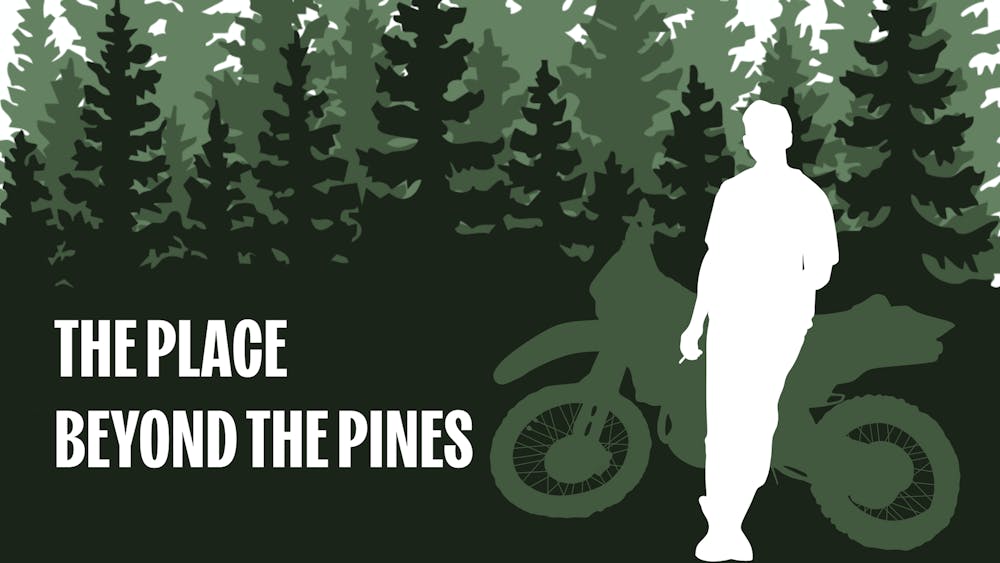There are films that entertain, and there are films that haunt you long after the credits have rolled. "The Place Beyond the Pines" belongs unmistakably to the latter. Derek Cianfrance’s third feature is not merely a story about men and their choices; it is a meditation on legacy, guilt and the invisible threads binding fathers and sons across time.
The film follows Ryan Gosling's character Luke Glanton, a motorcycle stunt rider with a questionable taste in tattoos, who has the responsibility of fatherhood thrust upon him unexpectedly. The crux of the emotional impact of the film largely relies on Gosling’s performance, and he more than stepped up, elevating the memorability of the film through his seminal performance. Luke’s presence fills every scene of "The Place Beyond the Pines," even when he’s not on-screen.
"The Place Beyond the Pines" is a film that builds outward from its modest premise until it becomes a modern American epic disguised as a crime drama.
When writing the film, Cianfrance decided to construct "The Place Beyond the Pines" as a chronological story, with no flashbacks or intercutting scenes, resisting the usual Hollywood instinct to hit you over the head with its messaging. As a result, the film unfolds in a linear descent through generations, a tapestry woven thread by thread until the full weight of its design hits you like a bullet to the stomach.
The overarching theme of the story and the film itself is the power of choice and the ripple effects that our choices can have on those around us. "The Place Beyond the Pines" displays this theme by telling its story across 15 years, allowing time to take its toll on the main characters. We see their growth and regression through a series of perspective shifts that give an entirely new meaning to every scene upon rewatching the film.
While less memorable than Gosling’s performance, Bradley Cooper brings his usual acting chops to the character of Avery, a lawyer turned police officer with a newborn son. Cooper shines when it comes to portraying Avery’s shift across the 15 year timespan, becoming a more distant father as a result of the events of the first act.
Ben Mendelson is unrecognizable as Robin, an aging former bank robber who fulfills a fatherly role to Gosling’s Luke. He possesses a palpable guilt for his actions throughout the film that is both impressive and enrapturing, especially on a second watch.
Cianfrance once likened his approach to life without editing, and that ethos breathes through the film’s structure. The cinematography of the film echoes every choice and mistake throughout all three acts, utilizing the same framing and camera movements to remind your subconscious mind of what came before, while maintaining its chronology.
The beautifully sweeping score composed by Mike Patton elevates the film to unforeseen heights, using musical motifs and character themes to communicate the relationship between characters as they grow and evolve. The overhead shot of Luke on his motorcycle, accompanied by Patton’s "The Snow Angel," is easily one of the most memorable examples of this technique, especially when it is revisited in the final act of the film.
Eva Mendes turns in an exemplary performance as Romina, a woman torn between fantasy and responsibility. She provides a much-needed motherly stability throughout all three acts of the film, centering the characters and events that revolve around her.
Throughout its runtime, "The Place Beyond the Pines" highlights the importance of the bond between father and son, whether it be by blood, adoption or otherwise. Cianfrance succeeds in the ambitious goal of establishing several of these relationships throughout the film, some smaller than others, but all of them essential to the overarching story.
If I were asked to put the film into a single genre, I would struggle to give you a straightforward answer. It’s equal parts a mature coming-of-age story, a crime drama and a surprisingly deep, slow-burning thriller. Like all of Cianfrance’s work, it maintains a darkly realistic but utterly believable depiction of the human experience, fraught with mistakes, morally grey decisions and devastating loss. Yet, in the final moments of the film, Cianfrance manages to fill the viewer with a cautious optimism that bookends all the mistakes made by the characters throughout the film.
4.7/5 — A haunting, masterfully-constructed American epic.
It’s difficult to imagine a film this ambitious being made often or this well. I would recommend "The Place Beyond the Pines" to fathers, sons and anyone who’s looking for a well-written drama that is devastatingly beautiful and entirely unique in its execution. Gosling’s haunted eyes and Cianfrance’s elegiac vision will stay with you long after the film has faded from the screen.
Derek Cianfrance’s "The Place Beyond the Pines" is a masterwork of structure and soul, a boldly linear epic that follows the ripple effect caused by our life choices. Anchored by Ryan Gosling’s quietly volcanic performance and elevated by Cianfrance’s unflinching direction, it’s a rare film that feels both intimate and mythic, a modern tragedy set across an unapologetically American backdrop.
Do you like this story? The Plainsman doesn't accept money from tuition or student fees, and we don't charge a subscription fee. But you can donate to support The Plainsman.
Logan Myers, freshman majoring in journalism, is from Hilton Head Island, South Carolina. He has been with The Auburn Plainsman since the fall of 2025. In his spare time, he writes short stories and novels in the horror/thriller genre and enjoys camping.





